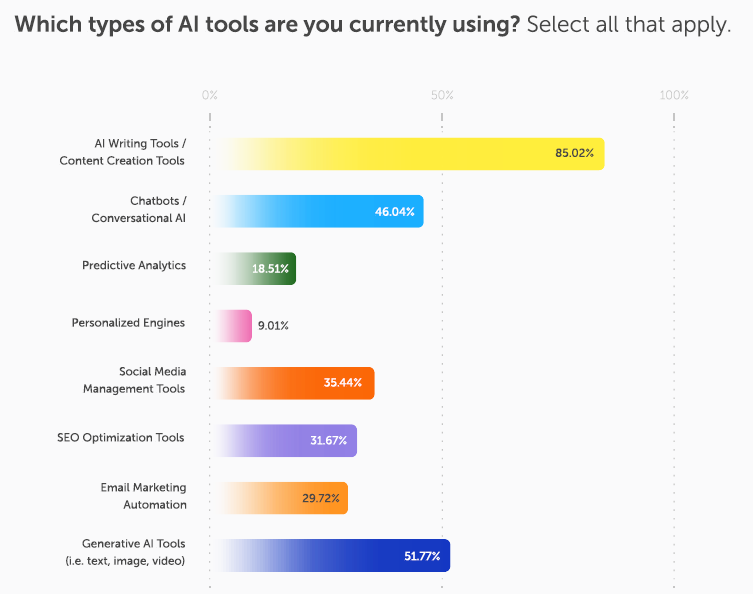Conversational marketing with chatbots represents a significant turning point for companies that want to improve engagement, optimize lead management and offer high-level customer service. Thanks to generative AI, these tools are no longer simple automatic responders, but real conversational assistants capable of understanding and satisfying the needs and proactively engaging the audience.
In the State of AI report, 93% of marketers report having integrated new artificial intelligence capabilities during 2024.
This trend highlights a shift towards increasingly AI-based tools and broader adoption by marketers across the industry.
In particular, 85% of marketers use AI Marketing tools for writing and content creation; 46% have integrated marketing chatbots and virtual assistants, 18% use predictive analysis tools.

So, marketing chatbots offer benefits that go far beyond simple content creation.
A recent McKinsey report estimates that Generative AI could contribute up to $4.4 trillion in annual global productivity.
Marketing productivity alone due to Gen AI could increase between 5 and 15 percent of total AI marketing spend, worth about $463 billion annually.
USER EXPERIENCE PERSONALIZATION WITH conversational marketing

Consumer behaviors are constantly evolving, and their high expectations for speed, convenience, and personalized experiences make it difficult for brands to understand and effectively meet their needs. To create a meaningful connection with audiences and meet those expectations, organizations must be flexible, agile, and up-to-date on consumer values and preferences. While this concept is not new to marketing, where companies that know their customers best and deliver personalized experiences are the ones that drive long-term engagement and loyalty, technology has made data collection and use more effective, especially first-party data. The adoption of solutions like conversational marketing has allowed marketers to automate processes, improving efficiency and reducing costs. However, the generative AI revolution is generating both excitement and uncertainty, as many organizations still struggle to implement a truly customer-centric and hyper-personalized marketing strategy.
Areas of Application of conversational marketing
Today, conversational marketing with chatbots is being used to automate content creation, personalize campaigns, analyze consumer data, and improve operational efficiency. AI also helps identify product opportunities, generate innovative ideas, and automate processes between marketing and other business functions. With its potential to speed up response times and improve customer experience, AI is proving to be a strategic ally for businesses.
Let’s see some examples:
PERSONALIZE INTERACTIONS
Marketing chatbots and virtual assistants allow you to respond to customer questions in real time, providing personalized and immediate assistance.
Tailor-made communication: by analyzing large amounts of data, marketing chatbots are able to segment audiences and send personalized messages, thus improving customer relationships and increasing loyalty.
INCREASE IN ENGAGEMENT
Optimized User Experiences: thanks to predictive analysis, conversational marketing identify user preferences and behaviors, allowing you to offer relevant content and offers that increase interaction and engagement.
Multi-channel Interaction: the use of AI tools allows you to coordinate campaigns on different channels (social media, email, website), ensuring a consistent and engaging experience.
Lead Generation
Conversational marketing with lead generation chatbots integrated within landing pages, proactively engage visitors, and collect contact information of customers potentially interested in purchasing.
Marketing Automation: by automating repetitive tasks such as sending emails and following up on potential customers, marketing chatbots allow you to improve efficiency and reduce response times, thus increasing the chances of conversion.
Whatsapp INTEGRATION
With conversational marketing t is possible to automate direct engagement conversations within outbound campaigns or in response to inbound information requests from the user, through the Whatsapp channel.
PR AUTOMATION
In the PR industry, Conversational Marketing helps improve efficiency by drafting press releases, social media posts, and blog articles, freeing up professionals to focus on strategic tasks that require intuition and creativity. In particular, in crisis communication management, AI can quickly generate statements to be inserted into the knowledge base of marketing chatbots and suggest appropriate responses based on audience sentiment, working to support brand reputation.
The Importance of Data in conversational marketing
Data is at the heart of every modern organization, created, stored, and analyzed at an unprecedented rate. For marketers, this explosion of data presents enormous opportunities for those ready to harness it. With the rapid growth of AI, it is becoming increasingly critical for organizations to ensure that the data needed to power AI solutions, such as marketing chatbots, is robust and easily accessible. By combining the data foundation and capabilities of AI with human expertise, companies can better understand people’s needs and the external factors that influence them. This holistic approach allows marketers to be more efficient in their investment strategies and execution, delivering hyper-personalized experiences for customers. However, many organizations still struggle to implement critical use cases, with over 40% of marketing leaders reporting they lack the maturity to effectively execute on these capabilities.
As Deloitte suggests in the study “Marketing and IT: The new data duo for AI-powered growth – How marketers can bridge the data divide to leverage the full power of AI to benefit from a unified data ecosystem and AI-powered marketing, collaboration between marketing, business and IT is desirable to implement an aligned vision of data and AI that fits the culture, values and growth strategy of the organization. The transformation required for this process represents an opportunity to transform the way you work with data and align IT and marketing teams towards a centralized vision, which reduces data silos to foster greater collaboration and democratize access to information.
ConclusionS
In short, conversational marketing with chatbots not only support the creation of quality content, but also enhance customer interaction, strengthen engagement, and optimize lead generation, providing a significant competitive advantage for companies.

